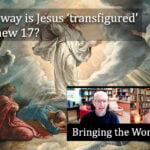 In case you are still looking for ideas on preaching this passage (or hearing it preached on) here is my sermon for this morning:
In case you are still looking for ideas on preaching this passage (or hearing it preached on) here is my sermon for this morning:
What is your vocation? What have you been called to? You might not think you have one—after all, isn’t vocation something for people doing worthy jobs that call for self-sacrifice—teachers, doctors, nurses, vicary types…?
Is it possible to have a vocation to be an investment banker, an entrepreneur, a manager, an administrator, a civil servant, someone who makes chocolate (as I used to do). Or is ‘vocation’ something for special people with a distinct calling, while the rest of us get on with life until and unless we see some writing in the sky or something equally dramatic?
Our gospel reading is about vocation or calling, of sorts—the word ‘vocation’ is not used, but Jesus is clearly calling and appointing some people to a particular task or activity.
Vocation is supposed to have a sense of satisfaction and reward that goes with it—but I’m not sure the ones Jesus called would have felt all that satisfied!
For a start, he has called them to hard work. Harvesting a field can be back-breaking labour, especially in the days before tractors and mechanisation, and it’s a job that nowadays we’d rather leave to other people (though of course that might all change). Worse than that, there’s a labour shortage, so there’s going to be more to do than ever. But that’s the metaphor Jesus uses to describe the work of proclaiming the kingdom.
Secondly, even with the work, it is hardly going to be a picnic. Sheep in the presence of wolves? I’m not an expert on the animal kingdom, but that doesn’t sound too inviting to me—not the kind of vocation I would feel very excited about!
And these poor people are not even allowed to make sensible provision—no money to buy food, no bag for a change of clothes, not even a spare pair of sandals. They have to trust to…well, what exactly? To Jesus? Or rather, to the very people that they have been sent to talk about the kingdom. It’s a kind of a deal, a swap—I’ll tell you about Jesus, you give me dinner and a bed for the night.
If that isn’t challenging enough, Jesus tells them not to be picky about what they accept for dinner. I visited someone in Oxford last week, and he asked me if there was anything I didn’t it. ‘Live squid’ was my answer. ‘I think I can manage to avoid that’ was the reply.
I was relieved, because some years earlier, when I was travelling, that is what I had been offered and it didn’t go down very well (in fact it didn’t really go down at all…)
But there was an even bigger problem for these guys. They would no doubt have been subject to Jewish scruples about food laws, and clean and the unclean—so it wasn’t just a matter of taste, it was a matter of religion, of holiness and of their standing before God. Jesus really is asking them to risk everything.
There is more challenge to come. Go into a town and heal people. I love the way he just mentions that in passing, as if it is no big deal. I guess perhaps that if you have been spending time with Jesus, seeing him do just that, you might have a good idea what you are doing here.
Then comes the really tricky bit, perhaps the bit we would find hardest—if they don’t accept your message, you are to confront them with the consequences of their decision, which is judgement by God. Jesus tells them to shake the dust off their feet—in the Old Testament, this was what they were to do if they’d ventured outside the territory that God had given them. On their return, they were to shake the dust and the dirt off their feet and sandals, so the holy land they had been given would not be polluted by the unholy nation they had come from.
As we’ve been realising in the last week or so, confronting people with the consequences of their decisions can be awkward, painful and embarrassing.
It was a sign of difference and a sign of judgement. It is sufficiently awkward and embarrassing for our lectionary to have nimbly jumped over the most awkward verses in our reading this morning.
Remarkably, despite all that, the 72 he has sent come back—and seem to have had a good time! They found that they weren’t devoured, that people did welcome them, that they were provided for, and that healing did take place—that they could trust Jesus when they responded to his call and obeyed his command.
Well, good for them! And thank goodness that it doesn’t apply to me! Or does it…?
I’m not sure that Luke is actually going to let us get away with that way of reading the story.
You see, there is a lot in the gospels about what it means to be a disciple—the word simply means ‘a learner’—we actually get our word mathematician from the term, and I used to be one of those too. But originally it meant not the painful thing you do in school, but all the things you learn from study.
Only, in Jesus’ day you didn’t learn from books, you learnt from people—from one particular person, your ‘rabbi’ (great one) whom you committed to be with, to follow, to learn from, both from his teaching and his way of life. You listened carefully and you watched intently and you tried to live your life exactly the way your rabbi did.
That was the term which the gospel writers use for people who decide to follow Jesus—either literally by leaving their previous occupations, or metaphorically by wanting to live out his teaching in their lives.
Now, very often, the word ‘disciple’ is applied to the 12, so we might be forgiven for thinking that all these things are just for a special group, a spiritual elite—the ‘full time’ professional Christian.
But that is not what the gospel writers tell us. At one point, Jesus’ family decide that he has gone mad and needs rescuing from himself, but can’t get to him because of the crowd around him. So they pass the word that they are waiting outside, and when Jesus hears this he gives a shocking answer. He waves his hand at the crowd sitting around, and declares that all these, all the ones listening, these are his disciples and these are his family.
Luke does something similar here. I wonder if you noticed that all this stuff in chapter 10 had already been done by the 12 apostles, the professionals (as it were) in chapter 9. Now, Luke tells us, it’s the job of the amateurs, the rest of Jesus’ followers.
And he goes on, in Acts (Luke part 2) to use the term ‘disciples’ not only to mean the other followers of Jesus, but to anyone who came to believe in him, even if they hadn’t met him in person, but knew about him because of what others had told them.
Luke appears to think that the things he’s talked about here might just apply to all of us.
That being a Christian can feel risky and vulnerable.
That it is not simply a question of being strong and having all the answers, but that we share faith in the context of vulnerability and weakness, with a sense of dependence on others.
And yet that we have, by God’s grace, something remarkable which the world around us desperately needs to hear. That we are able to bring healing to a broken world and to broken lives—because we have experienced the healing of God’s love for ourselves.
Interestingly, the Eucharistic liturgy appears to agree. Have you ever paused to reflect on the final prayer of thanksgiving that we often say together to finish?
After expressing gratitude for God’s love for us expressed in Jesus and received in bread and wine, we ask that he might do something more with us once we have left the service.
‘May we who share Christ’s body, live his risen life. May we who drink his cup, bring life to others. May we whom the Spirit lights, bring light to the world.’
As we leave, we hope that we might live Jesus’ risen life for others to see. In Luke 10, Jesus sent his disciples to ‘all the places that he wanted to go’ and he does the same today. Jesus wants to go to your street, your extended family, your place of work. and he has called and sent someone to be his presence there, proclaiming peace, bring the kingdom.
There is a place in the NT which is the place of the presence of God, the meeting point of heaven and earth, where people can encounter the divine presence. But it is not a building, and it is not a priestly caste—it is the whole people of God, the body of Christ, you and me all.
He has commissioned each one of us as a worker to go into the harvest fields of our places of work, our homes, our neighbourhoods, our circles of friendship.
We hope that we might bring his life to places where there is death and disappointment. And we hope that we might bring light into places where there is darkness and despair.
He tells the 72 not to make their own provisions—everything they need will be supplied. And he says the same to us. All that we need for this immense task he has supplied by his death and resurrection and through the gift of his Spirit to us. We’ve been ‘ransomed, healed, restored, forgiven’…and that has given us everything we need.
After the 72 embarked on this risky adventure of putting their lives on the line, they return with joy—full of joy, overjoyed. And Jesus’ promise is that, whatever challenge or hardship we find in the task, we will come back overjoyed as well.
Follow me on Twitter @psephizo
Much of my work is done on a freelance basis. If you have valued this post, would you consider donating £1.20 a month to support the production of this blog?




























Thank you thank you – a timely gift from God!
A good reminder of decipleship, encouragement to work through trials because the end result is always joy!! Thank you.
Really Nice..Liked it.Could you share rhe verse from the book of luke which is for the healing of sick..as i am suffering from lower back pain.Praise God.
I found this very inspiring. My Vicar came down ill and I am preaching and presiding on Sunday, only a couple of days notice. Your article saved the day. Thankyou
That is great to hear! Well done!
A good understanding of God’s presence and continued work in the world! Is there a photo credit for the colorful image used at the top of this post?
No, but you can find it by doing a reverse Google image search easily enough.